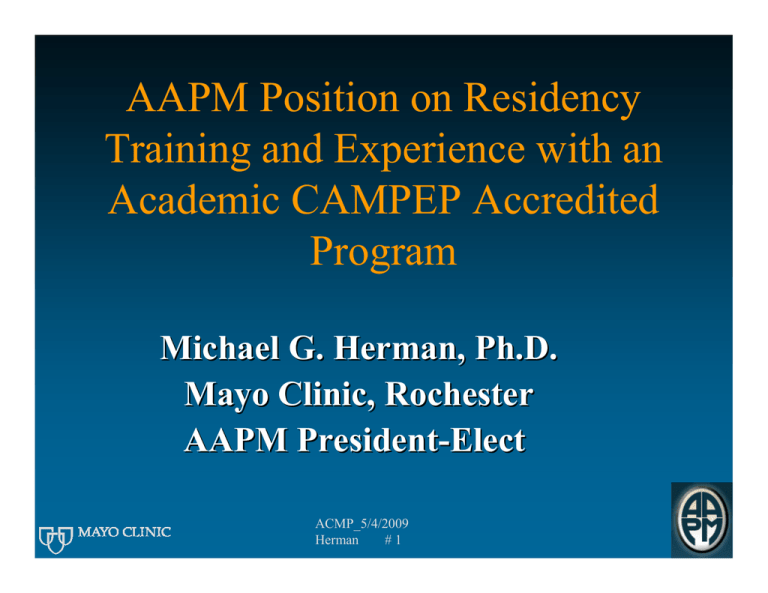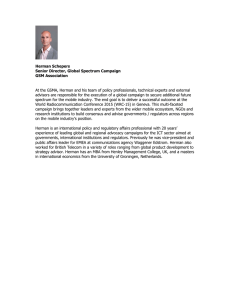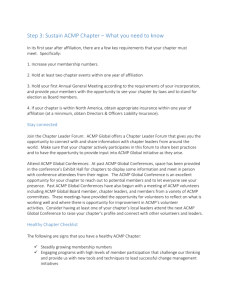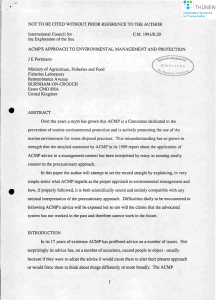AAPM Position on Residency Training and Experience with an Academic CAMPEP Accredited Program
advertisement

AAPM Position on Residency Training and Experience with an Academic CAMPEP Accredited Program Michael G. Herman, Ph.D. Mayo Clinic, Rochester AAPM President-Elect ACMP_5/4/2009 Herman #1 Outline • Why are We Here? • AAPM Efforts Consistency • Experience in an Accredited Program ACMP_5/4/2009 Herman #2 It is ALL about Patient Care • Ultimately, the result of our work, regardless of whether we are researchers, educators or clinicians is the best possible patient care • Providing tools and resources to improve the human condition • We are fortunate that this is actually fun too and our services are in demand ACMP_5/4/2009 Herman #3 Clinical • • Definition of a Qualified Medical Physicist - AAPM A Qualified Medical Physicist is an individual who is competent to practice independently one or more of the subfields of medical physics. From - Scope of Practice (ACMP-AAPM) The essential responsibility of the Qualified Medical Physicist’s clinical practice is to assure the safe and effective delivery of radiation to achieve a diagnostic or therapeutic result as prescribed in patient care. ACMP_5/4/2009 Herman #4 AAPM 2007 Profession Survey Data 3106 Responded of 4662 surveyed of ~7000 Clinical (79%) Academic (9%) Administr... Regulatory (3%) R&D (5%) Applications (1%) Diagnostic Radi... Radiation Oncology Nuclear Medic ine Magne tic Reson... Rad Safety/Healt... Engineering ACMP_5/4/2009 Herman #5 Ultrasound Administrati ve Quality Patient Care • Patients and colleagues deserve to have properly trained clinical medical physicists participating in practice. • Is provided by properly, thoroughly and consistently trained professionals – – – – Physics fundamentals Didactic Medical Physics (Report 79) Clinical Medical Physics (Report 90) Board Certification ACMP_5/4/2009 Herman #6 Consistency • All ABMS boards have Consistent Quality – premise of all certification boards: “…. certification…requires between 3 and 6 years of training in an accredited training program …..” – Except Medical Physics, Medical Genetics • Accredited Clinical Training Matters – CAMPEP accredited residency program grads pass the ABR at a 95% rate, (2005 and Now!) – Overall ABR average is 53% (MedPhys 2005 PCP) ACMP_5/4/2009 Herman #7 2012/2014 Initiative • Toward Consistency in Training • Responds to ABR requirements for education and training. • Responding to ABMS, aligns with CARE. • To sit for ABR: - in 2012 - CAMPEP-accredited degree program or residency required - 2014 - CAMPEP-accredited residency required • Effort- AAPM, CAMPEP, ABR, ACR, and ACMP. ACMP_5/4/2009 Herman #8 2012/2014 Considerations • Grad Student Production: – 21 CAMPEP-accredited graduate programs – ~ 300 per year from ALL programs 2:1 MS/PhD – Where do the graduates go for required residency training? • Facilitate accreditation and growth of existing programs – Conventional residency • Support development of alternative pathways – Develop the potential for a professional doctorate degree • How can it help?; What might it hurt? – Convert OJT/junior slots to (accredited) residency – Investigate combined therapy/diagnostic residencies ACMP_5/4/2009 Herman #9 2012/2014 Considerations • Alternative programs – – – – Limited Affiliation Dependent Affiliation Practice groups with academia Encourage MP graduate programs to create or affiliate with residency programs • Support consistent national recognition programs that equate Board certification with QMP – Licensure, national registry • Develop creative residency funding mechanisms – PDMP , Converted OJT , Grants…. ACMP_5/4/2009 Herman # 10 The “Old” Pathway(s) Consistent?,Equivalent?, Sufficient?, QMP? Best Patient Care? 54% CAMPEP MS,PhD On the Job Physics Ph.D CAMPEP 15% Residency Physics MS ABR 18% Non-CAMPEP Residency Post Doc ACMP_5/4/2009 OJT – no Mentor Herman # 11 14% ???% TG133-2008 THE Pathway Equivalent!, Sufficient!, QMP! CAMPEP MS,PhD Physics Ph.D Clinical Medical Physics Residency ABR Certification Physics MS ACMP_5/4/2009 Herman # 12 TG133-2008 What’s In the Box? Did acti c/cl CAMPEP MS,PhD inic Affiliate and Primary Combine Efforts in a– Limited or Dependent manner al Affiliate Residency Physics Ph.D Conventional Residency Physics MS Physics BS ABR Certification Medical Physics Fellowship Doctorate of Medical Physics ACMP_5/4/2009 Herman # 13 didactic/professional refreshers ACMP/AAPM/academics TG133-2008 AAPM 2012/2014 $ Allocated/Spent • Planned investment of $100 K for 2008, • Feb 2009, recent 2012 Initiative Meeting ~ $20 K • Workshops: non – CAMPEP Residency Program Directors ~ $20k – – – – Help in Self Study Completion - $10 K Workshop of Feb 6-7, 2009 25 program directors (3 imaging), excellent program second one planned for Fall of 2009 • Workshop: non-CAMPEP Academic Program Directors – – SDAMPP is coordinating some work – budgeted $20 K ACMP_5/4/2009 Herman # 14 AAPM 2012/2014 Money Cont’d • Improving CAMPEP Process - $10K – AAPM HQ now taking on application processing and logistics, more to come to streamline • Distributed Residency Demo - $10 K – – – – This is happening, no money was requested Mayo - KCCC/USO limited affiliation example Others have recognized that they can accredit alone TG133 is complete and posted on the AAPM Web • Launching DMPs - $10 K – This is happening at Vanderbilt, THSC, elsewhere, funded thus far by institutions – program consistency? - WGDMP ACMP_5/4/2009 Herman # 15 We’re Making Real Progress • Therapy; we are making substantial headway • Imaging; more work to be done – some traction being gained • Anyone who is doing clinical training could/should ultimately have an accredited program - Through available mechanisms • Probably some investment next few years – Budget $100k for 2009 ACMP_5/4/2009 Herman # 16 Total Possible Residencies and Resident Positions Gerbi, 4/2009 NCCAAPM Therapy Imaging 28 3 CAMPEP accredited 36 4 Programs in review 8 Programs represented at Feb. 2009 MPR writing workshop (Dallas, TX) 22 Other programs 16 - TOTAL 74 89 7 8 2 1 Vanderbilt, 5 Texas Tech, 5 - 3 38 Potential residents per year (at 1.2 residents/prog-yr) DMP programs Residents per DMP Program per yr 1 ACMP_5/4/2009 Herman # 17 PDMP – What Is It? Coffey – Feb, 2009 Summit • • • • • Professional Degree (PDMP) not a Research Degree (PhD) Combines Didactic and Clinical Training Four – Five Year Program More than a MS Degree and a Clinical Physics Residency PDMP May Allow Completion of Clinical Training Off Campus at a CAMPEP-Accredited Residency Program • Students Pay Tuition for Duration of the Program (perhaps stipend) • May Limit the Number of Graduates per Year (compared to MS) • Meets Eligibility Requirements for ABR Physics Exam (Parts I and II) • Coffey Recommendations • Name: PDMP • Curriculum: > MS + Residency ACMP_5/4/2009 Herman # 18 Society of Directors of Academic Medical Physics Programs, Inc (SDAMPP) Dobbins – 2/2009 Summit – Spawned from AAPM SC Objectives – To promote better coordination between academic MP programs – To foster establishment of educational best practices – To monitor production of MS and PhD graduates and MP residents relative to job market – To assist new MP programs getting started – To serve as a voice for academic program directors – To help medical physicists in developing countries establish educational programs ACMP_5/4/2009 Herman # 19 We Care • Remember why we do what we do • They are counting on us to do it well and make it better. • AdHoc Training won’t do! “We should be as good as our patients think we are” – Sister Generose to the Mayo Staff ACMP_5/4/2009 Herman # 20 Mayo Clinic Accredited Residency/Fellowship - Therapy • Began as Residency in 1997 – Competency Based, Written report – based – Residency nominally 2 years • Initiated Fellowship in 1999 – Full residency PLUS research - integrated • Prepared for and received Accreditation in 2003 ACMP_5/4/2009 Herman # 21 Mayo Clinic Accredited Residency/Fellowship • Resides within Mayo School of Graduate Medical Education – Large supporting infrastructure – Internal reviews – Keep up with ACGME? • Make sure we are part of the Allied Health training reimbursement from CMS. ACMP_5/4/2009 Herman # 22 Mayo Clinic Accredited Residency/Fellowship • Admissions – Ph.D – Medical Physics, Physics (experimental) – 35- 45 complete full on-line applications/year • Academic Record, C.V., Personal Statement, Transcripts, Reference Letters – Follow AAPM WGCMPR time guidelines – Early years – fewer applicants, none from MP ACMP_5/4/2009 Herman # 23 Program Objectives • • Resident is expected to become competent in all areas related to the safe and efficacious use of ionizing radiation as it relates to simulation, planning and treatment of human disease; Consistent Qualified Medical Physicist ACMP_5/4/2009 Herman # 24 Mayo Program Rotations • • • • • • • • • • • I. Dosimetric Systems, (Ion Chamber, Film, Diodes, TLD) II. Physicist of the Day and Plan Check III. External Beam QA IV. Shielding and Room Design V. Radiation Safety VI. Treatment Machine ATP, Survey, Commissioning VII. Treatment Machine Calibration VIII.Simulator Acceptance Testing and QA (Fluoro) IX. Simulator Acceptance Testing and QA (CT) X. External Beam Treatment Planning (3D CRT) XI. TPS Commissioning ACMP_5/4/2009 Herman # 25 Mayo Program Rotations • XII. MU Calculation • XIII.IMRT Planning and QA • XIV. Special Applications (TBI, TSE, shields, dosimetry, pacemakers) • XV. Stereotactic Radiosurgery (Gamma-knife) • XVI.SBRT (Stereotactic Body Radiation Therapy) - New • XVII. Intra-Operative Electron RT • XVIII.Brachytherapy (HDR, LDR) • XIX.Regional Practice Rotation • XX. Particle Therapy Rotation – WIP • XXI. IGRT - WIP ACMP_5/4/2009 Herman # 26 Mayo Program Rotations ACMP_5/4/2009 Herman # 27 Clinical Credentialing ACMP_5/4/2009 Herman # 28 Research • Research is integrated into the Fellowship – Practical and clinically meaningful – Hands on – Abstracts/publications • IGRT, Dosimetry, Particle Therapy, Informatics ACMP_5/4/2009 Herman # 29 Affiliation • Following the AAPM TG 133 (alternative Pathways) description of a limited affiliation • Relationship with US Oncology/ Kansas City CC – – Residents from either program can travel to obtain training – B Wichman talk.. ACMP_5/4/2009 Herman # 30 Mayo Program - Successes and Challenges • Graduates 6/8 residents and 5/5 fellows with 5 currently in program • ALL graduates that have taken ABR and have passed full exam on first attempt. • However only 11/13 graduated – Place residents on probation – well defined structure for discipline ACMP_5/4/2009 Herman # 31 Mayo Program Evolution • Went away from written reports (Thesis) – Toward oral/interative rotation exams – PPT – Routine quarterly orals • Converted all positions to three year Fellows – maintain research component – three years of experience – allow time for didactic training • Reaccredited in 2008 ACMP_5/4/2009 Herman # 32 Conclusion • It is ALL about Patient Care • Consistent, high quality clinical work comes from consistent, high quality training and experience. • Substantial progress is being made all training being accredited • An accredited program must adapt/morph ACMP_5/4/2009 Herman # 33


